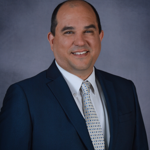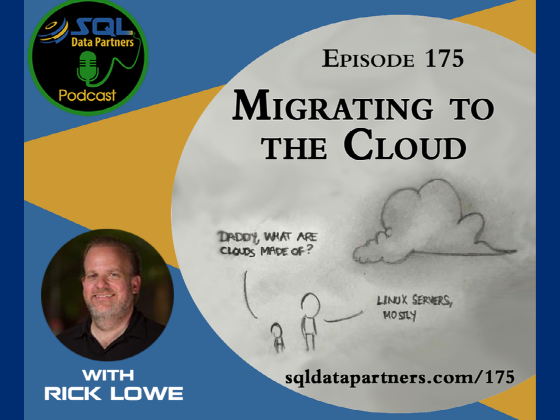Migrating to the Cloud
Are you in the cloud? Lots of folks are talking about moving to the cloud; however, as we find in today’s episode this can be tricky to quantify what people mean by being “in the cloud”. We are happy to welcome Rick Lowe to the show and he gives his take on working with AWS. We explore what it means to move to the cloud, our experience helping companies get there, why companies would want to consider cloud options, and how you can keep up with all the craziness of new technologies in the cloud.
Episode Quotes
“[There can be] kind of a lift and shift mentality of, “let me take this existing set of instances, virtually pick them up, drop them in the cloud and expect everything to work the same, and that’s, unfortunately usually not an optimal use case for the cloud. Ideally you’d do some more re-architecting.”
“The default storage option in AWS is backed up by solid state discs, but they’re solid state discs that might be on the other side of the data center from where your hypervisor is sitting, so there’s going to be a lot more latency than you’re used to.”
“For the most part, especially if you’re doing a one-for-one, call it lift-and-shift into the cloud, it tends to get more expensive in Amazon.”
Listen to Learn
00:37 Intro to the guest and team
01:11 Compañero Shout-Outs
01:44 Intro to the topic
04:11 What does migrating to the cloud look like?
06:41 “Don’t just lift and shift. Revise what you’ve got.”
09:37 You have to think about availability a little bit differently
11:36 Things to think about when deciding to move to the cloud
12:56 Discussion on costs and what you should do about them
15:38 Setting up processes in advance will help with costs in the long run
16:56 Do you save money by going to AWS?
20:00 How to keep up with new services without losing your mind
25:51 Last thoughts on the cloud from Rick
26:55 SQL Family Questions
29:14 Closing Thoughts
Our Guest

Rick Lowe
Rick is a Microsoft Certified Master with more than 15 years of experience working with SQL Server. He currently works as an independent performance DBA/Developer for clients across the USA and Canada. He started his career as a database developer, but over time became more and more interested in how the database engine operated … eventually becoming more focused on operational and performance issues than code.
Rick will work with all things relational, but most enjoys helping smaller companies get better performance from MSSQL, as well as smoothing over relationships between DBA and development teams.
Rick’s blog: https://dataflowe.wordpress.com/
Meet the Hosts

Carlos Chacon
With more than 10 years of working with SQL Server, Carlos helps businesses ensure their SQL Server environments meet their users’ expectations. He can provide insights on performance, migrations, and disaster recovery. He is also active in the SQL Server community and regularly speaks at user group meetings and conferences. He helps support the free database monitoring tool found at databasehealth.com and provides training through SQL Trail events.

Eugene Meidinger
Eugene works as an independent BI consultant and Pluralsight author, specializing in Power BI and the Azure Data Platform. He has been working with data for over 8 years and speaks regularly at user groups and conferences. He also helps run the GroupBy online conference.

Kevin Feasel
Kevin is a Microsoft Data Platform MVP and proprietor of Catallaxy Services, LLC, where he specializes in T-SQL development, machine learning, and pulling rabbits out of hats on demand. He is the lead contributor to Curated SQL, president of the Triangle Area SQL Server Users Group, and author of the books PolyBase Revealed (Apress, 2020) and Finding Ghosts in Your Data: Anomaly Detection Techniques with Examples in Python (Apress, 2022). A resident of Durham, North Carolina, he can be found cycling the trails along the triangle whenever the weather's nice enough.
Want to Submit Some Feedback?
Did we miss something or not quite get it right? Want to be a guest or suggest a guest/topic for the podcast?
